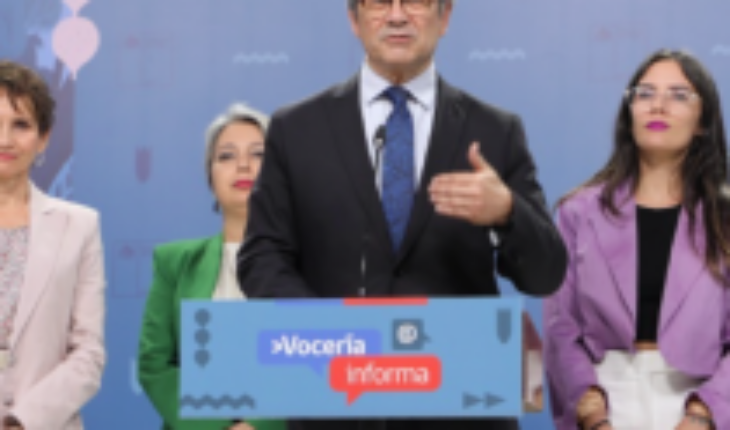Submitted by:
Good and happy Monday! I interrupt your long Halloween weekend with a limited edition of El Semanal… and trying not to be afraid of what is coming.
What’s on the agenda for this short week? Everything! To start, the Imacec of September, which should confirm that we are already well on our way to a recession. To that we must add the Casen, which will force us to look in the mirror and face our still great challenges in terms of inequality and poverty.
The reality is that, three years after the social outbreak, and due to a series of factors (the pandemic is just one of them), we are a poorer, more indebted country, with less employment and inflation. A combination that could be a breeding ground for populism.
Also this week: the icing on the cake. On Wednesday or Thursday the long-awaited pension reform will be announced. It will be the third attempt in 15 years. It is one of the emblematic reforms of the agenda of the Government of Gabriel Boric, whose potential impact on the capital market and the economy is enormous.
And if that were not enough, we have the result of the elections in Brazil: Lula is president again. It was by the slightest advantage and nothing ensures that an already polarized country will be further divided. And what happens in Brazil affects the entire region and we are no exception. The impact is geopolitical and economic. The region, including Chile, Colombia and Peru, has in the past year shifted to the left. Now we’ll see where Brazil does it.
We will talk about all that and a couple of other things in this edition of El Semanal, which includes an extensive interview with the Minister of Economy, Nicolás Grau, in which he talks about the lithium agenda, advances details of what will be the development bank that the Government wants to create, in addition to recognizing that part of the challenge of generating confidence lies in greater coherence between what they are saying both the economic team like President Boric himself and what is being done.
But before we start, we are closing two weeks of celebration during which we celebrate our birthday! That’s right, El Semanal turned 3 years old accompanying you on Mondays and 1 year in your inbox on Thursdays with El Semanal Exprés.
And today we want to invite you to join – or add a friend, colleague, family – to the community that receives the full version on Sundays and Thursdays. And for that here we have a special offer designed for you. It is an unmissable offer. We are waiting for you!
1
1- A VERY COMPLEX AND HARD WORK 2023
What’s coming. The harsh adjustment that the Chilean economy is experiencing will be confirmed this week when the September Imacec is published, which should confirm what the sectoral figures showed on Friday: activity is in sharp decline, jobs are being lost and the economy is slowed down.
The BCI estimates that the recession is already a reality and that the collapse of retail sales and the drop in manufacturing activity last month, are data that suggest that the Imacec of September will record a fall of around 2% annually, “inaugurating a long sequence of months of negative figures”. Of course, the report points out that the adjustment of the economy “allows to correct the macro imbalances accumulated in the last two years.”
The document warns that the only way that the contraction of GDP in 2023 is not longer and deeper than anticipated, “is to give signals that leave out discretion in the processes of approving new investments, reaffirm the vote of Congress regarding TPP11 and strongly install the mandate of society after the September plebiscite, in the sense that progress is made with broad agreements and consensus on key reforms.”
Worrying facts: Jorge Selaive, chief economist at Scotiabank, warns about the labor market. He highlights that in the July-September quarter 35,000 salaried jobs were destroyed, “and we still do not see the worst of the cycle with figures of consecutive contraction of GDP that would begin with the September record.”
It’s not all bad news. On Friday, the International Monetary Fund (IMF) highlighted the fundamentals of the Chilean economy and described as “remarkable” the fiscal results in 2022, where a surplus of 1.6% of GDP is expected (the first surplus in a decade). It was part of the statement he issued summarizing the end of this year’s Article IV mission of the agency.
If you want to read the full analysis, here is a special offerial in honor of El Semanal’s birthday. And for that here we have a special offer designed for you. It is an unmissable offer. We are waiting for you!
2
2- THE SECOND MAJOR REFORM IS COMING
What’s going to happen. All the signs from La Moneda and the Treasury suggest that this week President Gabriel Boric will present the pension reform to the country. The details were discussed at Friday’s last Cabinet Council in La Moneda. It is the second of the major reforms, after the tax reform.
The Minister of Finance, Mario Marcel, confirmed that it will be a mixed system with private participation and that individual capitalization is not eliminated.
“When we talk about a mixed pension system, it means that all the actors in the system contribute: the State, employers and workers. We are designing a system that will benefit all pensioners, current and future. No worker is going to be worse off with this reform. On the contrary, all will improve, some in greater proportion, given that they are sectors that are more neglected, especially women.”
Is the third one the loser? The proposal that the President will present will be the third attempt to reform the pension system in 15 years and then two commissions (Marcel and Bravo) that have reached quite similar conclusions about what needs to be done, including that we contribute little and retire very young.
Economist Miguel Lorca, an academic at the Faculty of Economics of the University of Chile and former economic advisor to the Ministry of Finance from 2011 to 2016, published a GREAT thread on Twitter in which he highlights the similarities, differences and what we still do not know.
It is worth mentioning that Lorca explains that his research focused on the areas of microeconomics, labor market, pension system and productivity.
If you want to follow the full thread, here is a special offer in honor of El Semanal’s birthday. And for that here we have a special offer designed for you. It is an unmissable offer. We are waiting for you!
3
3- GRAPH OF THE WEEK: X-RAY OF A CHILEAN FAMILY
This week the president of the Central Bank, Rosanna Costa, presented the results of the Household Financial Survey (EFH) 2021. The EFH aims to obtain detailed information on the financial situation of households in the country. It is done every five years and this version coincided with the pandemic.
In particular, the survey asks about the state of families with respect to their savings, their debts, their income, their financial assets and their use of means of payment.
One of the positive results, as the graph shows, is that in the last 5 years the average income of a Chilean household increased 13% in real terms. And mainly for section 1, that is, for the 50% of lower incomes, which improved their situation. This does not consider withdrawals from pension funds. Tier 1 includes households receiving incomes of up to $1,138,860.
If you want to read the full analysis, here is a special offer in honor of El Semanal’s birthday. And for that here we have a special offer designed for you. It is an unmissable offer. We are waiting for you!
A message from the AFP Association
For more information click on the image
The AFPs and the Universal Guaranteed Pension (PGU)
4
4- A TALK WITH NICOLÁS GRAU, MINISTER OF ECONOMY
Nicolás Grau: “We are committed to having a lithium agenda with transversal support before the end of the year that will include a role for the private sector.” In addition, he acknowledged that in the Government there has to be greater coherence “between what we say about our project for the economy and what we do.”
The Minister of Economy was the guest of La Mesa de El Mostrador this week. In an extensive interview, he revealed that the basis of what La Moneda will announce will be the work that was done during Bachelet II. And he stressed that the lithium boom is a great opportunity to finance the productive transformation.
Grau said that the development bank will be mainly a green entity that will aim to mobilize private and public resources to projects that have high risk but transformative potential for the economy. And he stressed that there will be no improvisation: “First we will launch a pilot plan through Corfo on a smaller scale.”
And with regard to the complex economic scenario, the minister said that the plan is to cushion the impact of the recession among the most vulnerable and use public investment to encourage investment, as well as job creation.
To view the full interview, click on this link or the image
5
5- NO HEELS OR TIES
– The crack impacts the visits to Chile of Joseph Stiglitz and Mariana Mazzucato. One is a Nobel laureate and the other is considered one of the most influential economists today. But both question orthodoxy, are fans of President Gabriel Boric and believe in a greater role for the state in the economy. And that was the main focus of most coverage.
The Nobel Prize in Economics gave two talks at the FEN. He arrived accompanied by the controversial and criticized former Argentine economy minister, Martín Guzmán. The economist spoke of neoliberalism and the “many dimensions of its failure,” as well as its proposal for “progressive capitalism.” He said he “loved” that Boric declared in his campaign that Chile will be the place “where neoliberalism will be buried.” Then, he added, “one of the reasons I was excited to come to Chile is to see the burial and be at the funeral.”
The theme of the funeral of neoliberalism also took center stage in Mazzucato’s visit. The economist was received almost as a state visit and generated an additional controversy for saying that she is looking at Chile “as an experiment to kill neoliberalism.” She later apologized and explained that it was a translation error and that she meant “experience.”
The story of the cancellation of the US$ 30 thousand talk. Mazzucato canceled it at the last minute, saying there were scheduling problems. El Diario Financiero assures that the decision to cancel was due to the noise it generated when it was learned that the talk, organized by Copesa and La Tercera, was largely financed by SQM. It seems that she did not like being splashed by the scandal of political money.
– La Moneda would not support the candidacy of Andrés Velasco to the Inter-American Development Bank (IDB) and would lean towards Nicolás Eyzaguirre to nominate him as candidate for the presidency of that financial organization. This is what sources who know what President Gabriel Boric is thinking point out. The choice for Eyzaguirre was originally reported by Ex-Ante. Velasco is the favorite of the United States, which is the country that barks loudest in the bank.
If you want the complete copucha, here is a special offer in honor of El Semanal’s birthday. And for that here we have a special offer designed for you. It is an unmissable offer. We are waiting for you!
Elon Musk already owns Twitter. He paid US $ 44,000 million and in the first 3 days fired much of the senior staff. The founder of Tesla, SpaceX, Starlink and PayPal, among others, now controls the world’s public square.
The big unknown: that the platform is in the hands of a super-rich with a controversial past when it comes to guaranteeing press freedom. A paradox: over the weekend Twitter censored a post to the new owner for spreading false news about the attack on the husband of the speaker of the House of Representatives of the United States, Nanci Pelosi.
6
6- RECOMMENDATION OF THE WEEK
China’s economy is rotting from the head. That’s the title of a column published this week by Daron Acemoğlu, professor of economics at MIT, and co-author (with James A. Robinson) of a book of much discussion in Chile and the world: Why Nations Fail: The Origins of Power. Prosperity and Poverty).
Democracy versus autocracy. The column is generating discussion and controversy and aims to answer a long-debated question about economic development: Can an autocracy outperform liberal market economies in terms of innovation and growth? Acemoğlu’s answer is NO.
China’s dilemma: how to maintain the Communist Party’s political monopoly in the face of an economically empowered and rapidly expanding middle class. The most obvious answer, and perhaps the only answer, has been further repression and censorship, which is the path Xi Jinping decided to take.
The MIT economist says there is growing evidence to suggest that Xi and his advisers misunderstood the situation and that China is about to pay a heavy economic price for the regime’s tightening control.
“Following the broad regulatory crackdown on Alibaba, Tencent and others in 2021, Chinese companies are increasingly focused on remaining in favor of political authorities, rather than innovating.”
“Inefficiencies and other problems created by politically motivated credit allocation are also piling up, and state-driven innovation is starting to reach its limits. Despite a large increase in government support since 2013, the quality of Chinese academic research is slowly improving. Even in AI, the government’s top scientific priority, advances lag behind global technology leaders, most of them in the United States.”
Submitted by:
That’s as far as we come this week. Before closing, remember that if you have any comments or reportsTo share with us, write to me at ivan@elmostrador.cl or in my networks.





